Bhuvana N, Ditty Maria Dominic and Sejal Agarwal recently had a dialogue with Dr Sowmini Sunkara, a passionate and accomplished entrepreneur who has harnessed her technical knowledge and entrepreneurial spirit to create meaningful impact in the field of rural development and agriculture. Excerpts from their interview are presented here.
| Agrighar Services Pvt. Ltd, established in 2019, is a social enterprise dedicated to promoting entrepreneurship and employment in agriculture and allied sectors, with particular emphasis on engaging youth, women, farmers, and Farmer Producer Organizations (FPOs). Their overarching mission is to minimize rural-to-urban migration by tapping into untapped rural potential. Agrighar serves as a one-stop platform, offering skill training, consulting, warehousing, job works, food processing, FPO/farm management services, and entrepreneurship development programs to bolster India’s rural economy. See http://www.agrighar.com for more information. |
Can you tell us about your journey from being a biotechnology expert to a social entrepreneur?
My journey has been truly fascinating. From a young age, I harboured a profound passion for learning and a relentless curiosity to apply my knowledge in practical ways. My academic background lies in agricultural biotechnology and I hold a PhD. I can talk proudly of over 12+ years of research experience, particularly in genetic engineering, molecular biology, plant tissue culture, and transformation. While my expertise was largely rooted in laboratory work, I began to feel a strong calling towards social entrepreneurship, in an effort to bridge the gap between science and business. This compelling need led me to immerse myself in the realm of social impact, where I could leverage my technical knowledge to create meaningful change.
From 2015 to 2016, I had a remarkable opportunity to involve myself in the Telangana Rural Inclusive Growth Project (TRIGP), working closely with the farming community at Society for the Elimination of Rural Poverty (SERP), Telangana. This experience brought me into direct contact with rural women and farmer groups and marked a pivotal turning point in my career. It deepened my commitment to explore the intricacies of rural and community development.
 Involvement in Telangana Rural Inclusive Growth Project- TRIGP
Involvement in Telangana Rural Inclusive Growth Project- TRIGP
In essence, my academic expertise and the invaluable network I’ve cultivated through my experiences have empowered me to become an entrepreneur dedicated to serving the farming community by using my services through agri-enterprises.
You’ve been involved in various organizations, including Agrighar Services Pvt. Ltd, Womenergy Association of Incubators in Manufacturing (WEAIM), and Agri Business Yuva Farmers of India (ABY farmers), and others. Can you elaborate on the roles and contributions you’ve made towards fostering entrepreneurship and innovation in the agricultural sector through these organizations?
My journey has been a continuous exploration of that which lies at the intersection between my academic background and my passion for rural development and agriculture. In 2005, I embarked on my research career as a scholar at ICRISAT in Hyderabad, specializing in Genetic Transformation. This path eventually led to the pursuit of a PhD at the same laboratory, deepening my expertise in genetic engineering, molecular biology, plant tissue culture, and transformation.
Fast forward to 2015-2016, a pivotal year when I transitioned into a new role as a consultant in sustainable agri-livelihoods for the Telangana Rural Inclusive Growth Project (TRIGP), supported by the World Bank and executed by the Society for the Elimination of Rural Poverty (SERP) in Telangana. It was during this engagement that I immersed myself in understanding the intricacies of vegetable value chains, gaining insights into the genuine needs of farmers in agriculture. Under this project, I played a crucial role in developing modules aimed at promoting agricultural livelihoods through value chains and Farmer Producer Organizations (FPOs). Moreover, I had the privilege of managing numerous Self-Help Group (SHG) members across all districts of Telangana, delivering various training programmes through SERP. This experience underscored the significance of food processing, value addition in the agricultural value chain, and the pivotal role of women in shaping these value chains. My aspiration and enthusiasm to become an entrepreneur took root here.
Subsequently, in 2016, I volunteered with Grama Bharathi, an NGO, allowing me to re-connect with farmers and FPOs engaged in natural and pesticide-free/organic farming. Here, I contributed by facilitating FPOs in marketing, certification processes, and gaining further insights into value chain activities through Grama Bharathi and FPC.
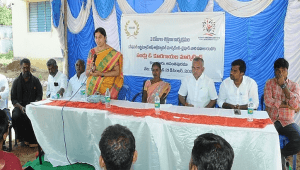 Anantapur FPOs Marketing training
Anantapur FPOs Marketing training
2017 marked a significant milestone in my journey as I became a seed investor for ABY Farmers’ ((7) ABY Farmers LLP: Overview | LinkedIn ) and took on the role of a designated partner. ABY Farmers is a social enterprise with a primary focus on agri-processing and marketing, directly sourcing commodities from farmers at market prices and sharing 50% of the organization’s profits with the farmers and Farmer-Owned and Managed Organizations (FMOs). Concurrently, I assumed the position of National Project Coordinator for Indo-German Cooperation on seed sector development and worked as a National Resource Person/Consultant in agri-value chains at the National Institute of Rural Development and Panchayat Raj (NIRDP). Here I gained invaluable experience that gave me a profound understanding of ground-level issues faced by farmers and the actions required to address at least 1% of these challenges. This eventually bloomed into a proprietary firm M/S Agri Ghar Services in 2018.
 NRLM-National Resource Person
NRLM-National Resource Person
In 2019, an opportunity came up to join the group of pioneering first-generation women entrepreneurs i.e., ‘WEAIM‘. This is India’s first ‘women incubator aggregator association’, dedicated to nurturing women in the manufacturing sector, with a strong focus on the MSME sector and this inspired me to work in depth on addressing the real problems faced by women entrepreneurs.
Meanwhile, in November 2019, I founded my brainchild, Agrighar Services Pvt. Ltd., with a vision to promote rural livelihoods through entrepreneurship and skill development programs and services, particularly in the fields of agriculture and allied sectors.
By 2022, I co-founded ‘WEMART Global,’ an exclusive e-commerce platform designed to showcase and connect women entrepreneurs’ products with global markets. In the same year I was honoured to be nominated as a ‘non-official member on the Executive Committee at the National Institute for Micro, Small, and Medium Enterprises (ni-msme), Hyderabad’, representing women’s associations.
Today, my full focus is on expanding the reach and impact of Agrighar Services Pvt. Ltd, reflecting my unwavering commitment to fostering entrepreneurship and innovation in the agricultural sector. These various leadership roles and the dedication with which I worked within these organizations are a testament to my commitment to drive positive change in rural development and agriculture.
How is the Agrighar initiative supporting farmers and women in agriculture and entrepreneurship?
Agrighar is a multi-faceted initiative aimed at supporting farmers, women, youth in agriculture and entrepreneurship. It provides a platform for various stakeholders in the agriculture sector, including entrepreneurs. We offer training and practical exposure in areas such as food processing, manufacturing, value addition, packaging and marketing. Our goal is mainly to bridge the gap between theoretical knowledge and practical implementation. Agrighar serves as a hub for learning, networking, and collaboration, empowering women to enter and excel in the agricultural sector.
What kind of services does Agrighar provide?
As mentioned earlier, we focus on skill training, agri-value chains, entrepreneurship development programmes, and FPO/Farm management.
We mainly impart skill-based practical training to the rural and urban youth in agriculture and allied sectors at the Agrighar’s integrated skill training centres. We organise exposure visits to the agri-entrepreneurs/progressive farmers, SHG women, and FPO representatives upon registration to visit our integrated skill training centre and multi-food processing manufacturing unit.
The second important service we provide is by connecting stakeholders in the agri-value chains. This is a one-stop networking platform for all agri-enterprises/service providers in the value chains through our end-to-end services, such as consultancy, skill development training, mentoring, warehouse and processing facilities. The FPO/farm management aspect is focused where the FPOs are provided services through unique business/profit sharing or consultancy modes. Frequent mentoring, consultancy and training programmes are given on entrepreneurship development programmes (EDP) to develop entrepreneurial abilities and skills required to run a business. Both offline and online entrepreneurship development programmes are conducted along with consultancy services.
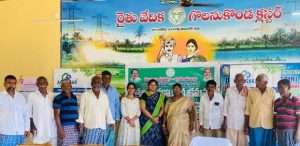 Aleru Farmers’ Meet in Telangana state
Aleru Farmers’ Meet in Telangana state
What are the capacity development programmes organised under Agrighar?
Agrighar mainly focuses on four kinds of capacity development programmes for farmers, FPOs, youth and any aspiring agripreneurs. The programmes include:
Exposure Visits: Agrighar organizes exposure visits for aspiring agri-entrepreneurs, progressive farmers, SHG women, and FPO representatives to visit our Integrated Skill Training Centre and Multi-Food Processing/Manufacturing unit on second Saturday of every month. This exposure visits are mainly to motivate aspiring entrepreneurs with different choices of agri-enterprises from farm to fork. Each visit costs Rs. 499 + GST/person.
AWAKE (Awareness Workshop on Agri-Knowledge for Rural Entrepreneurship/Employment): AWAKE is much more detailed mentoring sessions on Agripreneurship programmes, where the feasibility of the entrepreneur is valuated. These sessions are conducted both offline and online so that we can reach to PAN India aspirants. Each session has a fee of Rs. 2,500 + GST.
Incubation Programme: Incubation programmes – primarily for aspiring entrepreneurs – focus on solar dehydration, millet enterprises, mini dal processing units, mini rice processing units, cold storage solutions, and cold-pressed oils. The programme offers support on various aspects, including documentation (such as Detailed Project Report [DPR]) preparation, project feasibility studies, government schemes/grants, facilitation of bank/loan linkages, and legal compliance. It also provides mentoring support, infrastructure facilitation, assistance with backward and forward linkages, networking opportunities with peers/business partners, institutional collaboration, marketing support, and post-business support to scale up businesses. This programme is conducted in Telugu, Hindi and English languages. It is promoted through social media channels and through Agrighar network connections. Each programme requires a registration and a participation fee of Rs. 20,000 + GST.
FPO Consultancy (AFC): Agrighar provides comprehensive support to Farmer Producer Organizations (FPOs), assisting them from inception to becoming well-formed, market-oriented groups. The services include baseline surveys, farmer mobilization, value chain development, capacity-building/training for directors, promoters, shareholders and staff, development and implementation of business plans, establishment of backward and forward linkages, infrastructure/machinery set up, value addition, food processing, marketing strategies for local, inter-state, and international markets, network partnerships with other FPOs, and assistance with accessing government schemes and loans.
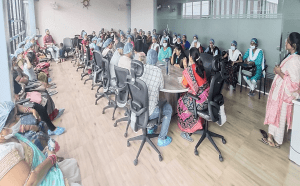 Exposure visits of FPO representatives & aspiring agripreneurs to Agrighar
Exposure visits of FPO representatives & aspiring agripreneurs to Agrighar
What is NEईंSHA by Agrighar all about?
NEईंSHA is the brand name for the culinary delights recently developed by Agrighar Services Pvt. Ltd. At present we are engaged in preparation of a range of mango rolls, dried veggies, instant millet breakfast & meal options (ready to cook), millet snacks (ready to eat), dry fruits and nuts, spice mixes. These are available on e-commerce platforms such as WEMART Global (www.wemartglobal.in) & Agrighar’s NEईंSHA mini store on Swiggy (https://agrighar.mini.store). Delivery is available across India and the products are purely marketed online.
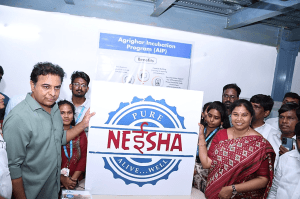 NEईSHA- Brand Launch
NEईSHA- Brand Launch
You’ve also emphasized the importance of digital tools in your initiatives. How have you integrated digital innovations into your work, and what benefits have you observed?
Digital innovations have played a crucial role in expanding our reach and impact. We’ve incorporated digital tools for various purposes, including online training, supply chain management, HR, and marketing. These tools have enabled us to connect with a wider audience, offer online courses, and promote our initiatives effectively. Digital marketing, social media, and e-commerce platforms have also helped us reach potential customers and collaborators. Most of our capacity development programmes reaching the concerned audience are through digital technologies, especially via social media. Starting with WhatsApp, we are highly active on Facebook, LinkedIn, Twitter, Instagram and YouTube.
I have empowered my team to be proactive in social media and also to use basic digital applications such as CANVA that helps us in designing posters. The team is also taught to acquire the minimum skills that enable them to mark likes, sharing, commenting, and posting on social media sites so as to reach our work to a wider audience. Most of our training programmes are conducted online via Zoom and awareness about our programmes are created through online platforms. 95%+ of our payments are online following digital India policy and recently our Agrighar-developed culinary products under the name NEईंSHA has gained visibility and popularity in online markets through publicity via digital applications. Overall, digital innovations have streamlined our operations and enhanced our visibility.
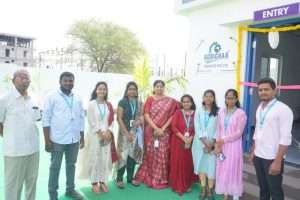 Team Agrighar
Team Agrighar
You’ve highlighted the need for awareness campaigns and training programmes. What steps do you believe are essential to raise awareness and promote entrepreneurship, especially among women?
Raising awareness and promoting entrepreneurship, especially among women, requires a multi-pronged approach. Firstly, there should be targeted awareness campaigns through webinars, workshops, and social media to educate women about available opportunities and resources. Secondly, public-private partnerships can facilitate the funding of training programmes and initiatives. Thirdly, creating a supportive ecosystem where women are encouraged to ask questions, seek help, and learn from one another is crucial. Lastly, improving access to information, such as subsidies and funding options, is vital to ensure that aspiring entrepreneurs are well informed.
Your journey has much influence on empowering women in agripreneurship. What inspired you to empower women and what are your goals in this regard?
My decision to empower rural women entrepreneurs stemmed from my experiences working in rural areas. Witnessing these women create livelihoods and businesses inspired me to do the same. I realized that if they could do it, so could I. This realization led me to move away from my research-oriented job and start my own enterprise. My primary goal is to empower rural women through various means, including training, skill development, and livelihood generation. I’ve now structured this vision into a business format, where we focus on scaling and enterprise development. Now I am empowering women not only on the financial aspects but also on the emotional aspects. We have a women association (WEAIM) where there is 30+ women entrepreneurs having varied business profiles. It is really tough to talk about branding or promotional activities, unless they understand the business. There is no dearth of knowledge; what’s required is the intention on what to do and how to do it. Knowledge is available. So, I mainly empower women now on how to overcome the emotional baggage while you are aspiring to empower socially and economically.
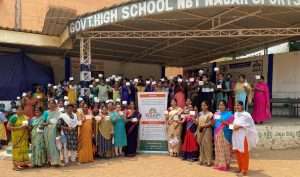 WEAIM – Period Donation Drive
WEAIM – Period Donation Drive
How do you see financial empowerment contributing to gender equality and women’s decision-making abilities?
Financial independence is the cornerstone of gender equality. When women have control over their finances, they gain a stronger voice in decision making, both within their families and in communities. It empowers them to make choices that align with their aspirations and needs. Financially empowered women can invest in education, healthcare, and personal development, breaking the cycle of dependency. This, in turn, leads to more inclusive and equitable societies. But, to become financially independent, she should be first independent in her own mind.
How many farmers/FPOs/women have you empowered in your journey and what are your plans for the future?
During both pre-and post-COVID periods I travelled a lot into interior areas for motivating thousands of farmers to organize into self centered, structured organisations – for example, farmer enterprises such as FPOs – which help them in gaining bargaining power, cultivation skills, and technology interventions. At Agrighar, we are now offering exposure visits to motivate these rural aspiring entrepreneurs, youth, SHG women and 80+ FPOs representatives (Each FPO represents 500-1000 farmers each) every alternate week to gain confidence to enter into food processing activities.
What is the kind of challenges women experience in their entrepreneurial journeys?
For an entrepreneur, challenge doesn’t differ by gender. But, for a woman challenges definitely prevail. Despite my qualifications and experience, I encountered challenges purely because of my gender. For instance, when I applied for a substantial loan of 2 crores, I was sanctioned 1.95 crores but was asked to have my husband sign as well. I firmly declined because I believe that women should be treated as individuals, not dependent on someone else’s endorsement. This experience made me question the prevailing gender biases in the business world and motivated me to advocate for change.
Have you undergone any training in incubation centres? How effective are they?
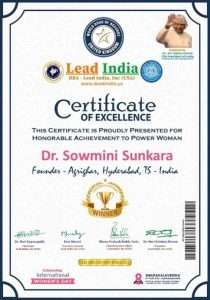 Yes, I was an incubatee at the National Centre for Management of Agricultural Extension (MANAGE) – Centre for Innovation and Agripreneurship (CIA) Cohort 3 under RKVY- RAFTAAR Scheme, GoI. In addition, I have successfully Completed Goldman Sachs 10,000 WSP 3.0 MOOC by IIM Bangalore & NSRCEL and also Women Entrepreneurship Development Programme (WEDP) from the National Institute of Food Technology Entrepreneurship and Management (NIFTEM). Incubation centres play a role in making one understand the process of entrepreneurship and to develop one’s own network with other entrepreneurs who are evolving new innovative ideas. These centres also provide you with an outline on what an enterprise should be, the requirements as mandated by law, and the general structure necessary to start an enterprise, together with orientation on the kind of support provided by the government.
Yes, I was an incubatee at the National Centre for Management of Agricultural Extension (MANAGE) – Centre for Innovation and Agripreneurship (CIA) Cohort 3 under RKVY- RAFTAAR Scheme, GoI. In addition, I have successfully Completed Goldman Sachs 10,000 WSP 3.0 MOOC by IIM Bangalore & NSRCEL and also Women Entrepreneurship Development Programme (WEDP) from the National Institute of Food Technology Entrepreneurship and Management (NIFTEM). Incubation centres play a role in making one understand the process of entrepreneurship and to develop one’s own network with other entrepreneurs who are evolving new innovative ideas. These centres also provide you with an outline on what an enterprise should be, the requirements as mandated by law, and the general structure necessary to start an enterprise, together with orientation on the kind of support provided by the government.
It must be kept in mind that incubation centres are not the end of learning for entrepreneurs. They only provide supporting sources for aspiring entrepreneurs. We must develop our own networks and learn all the necessary upgraded digital skills and we should know how to sell our enterprise to survive in the world of startups/enterprises. I have attended several online courses during the COVID-19 period so as to empower myself before I start something to empower farmers/women/youth. For example, even though I had experience of working with FPOs, I attended various online classes to know in depth about the FPOs and its management. Similarly, business development, food processing technologies, how one can motivate women in the rural areas and many other such courses I learned online. Furthermore, as needed, I also attended offline courses to enhance my skills. As I have mentioned earlier, there is no shortage of things to learn. I learn when I realise that there is a need to know more.
What are the major recognitions you have received in your entrepreneurial journey?
I was felicitated by MANAGE for being selected as a Finalist for the National Entrepreneurs Award (NEA), from Ministry of Skill Development and Entrepreneurship (MSDE). I was a panellist on the Global Forum for Food and Agriculture (GFFA) – 2021. I am invited as a resource person by many organisations to empower youth, women and students. Special thanks also go to print, digital & broadcast media for covering our story under various categories.
 Recognition from Telangana State Government for Indo–German Project and Women’s Leadership Award 2023 from HYBIZ TV
Recognition from Telangana State Government for Indo–German Project and Women’s Leadership Award 2023 from HYBIZ TV
Based on your journey so far, what advice would you like to give to aspiring women entrepreneurs?
To all aspiring women entrepreneurs out there, I say: “Learn to say ‘No’ when needed, never hesitate to ‘Ask’ for help or resources, and always be ready to ‘Talk’ about your ideas and challenges.” But you also need to prepare for ‘No’ because obstacles will certainly come your way, but your determination and resilience will lead you to success.
Acknowledgement: This interview was done as part of the IRRI-CRISP ongoing project ‘Mapping of Good Practices in Digital Innovations in India Supporting Women Agrientrepreneurs’.
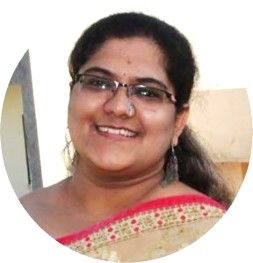 Bhuvana N, is a Consultant at the Centre for Research on Innovation and Science Policy (CRISP), Hyderabad. Her research interests include organizational ecosystems and effectiveness, social networks, environmental impact assessment and technological change. She can be reached at: bhuvanaditya7@gmail.com
Bhuvana N, is a Consultant at the Centre for Research on Innovation and Science Policy (CRISP), Hyderabad. Her research interests include organizational ecosystems and effectiveness, social networks, environmental impact assessment and technological change. She can be reached at: bhuvanaditya7@gmail.com
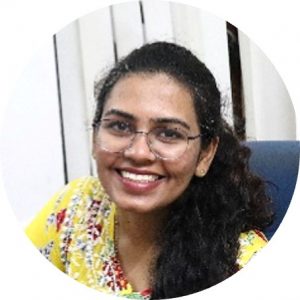 Ditty Maria Dominic, Research Fellow at Centre for Research on Innovation and Science Policy (CRISP), Hyderabad, Telangana, India. She can be reached at: ditty794@gmail.com
Ditty Maria Dominic, Research Fellow at Centre for Research on Innovation and Science Policy (CRISP), Hyderabad, Telangana, India. She can be reached at: ditty794@gmail.com
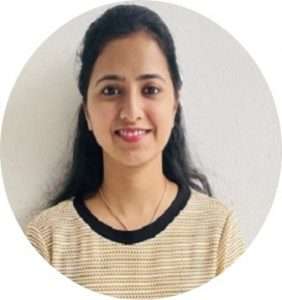 Sejal Agarwal, till recently worked as a Research Fellow at the Centre for Research on Innovation and Science Policy (CRISP), Hyderabad. She is presently working with Oorja Development Solutions Limited as Impact Manager She can be reached at sejal.iifm@gmail.com
Sejal Agarwal, till recently worked as a Research Fellow at the Centre for Research on Innovation and Science Policy (CRISP), Hyderabad. She is presently working with Oorja Development Solutions Limited as Impact Manager She can be reached at sejal.iifm@gmail.com



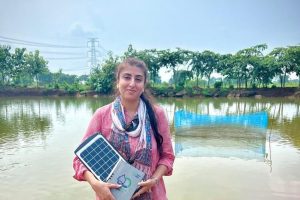

Add Comment